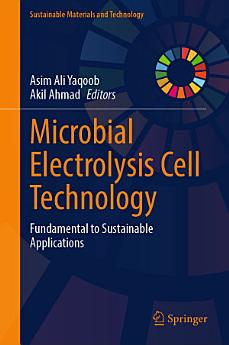Microbial Electrolysis Cell Technology: Fundamental to Sustainable Applications
Tungkol sa ebook na ito
Tungkol sa may-akda
Dr. Asim Ali Yaqoob received his Doctor of Philosophy in Material Chemistry from Universiti Sains Malaysia (USM) under the supervision of Associate Prof. Dr. Mohamad Nasir Mohamad Ibrahim. Currently, he is working as teaching assistant at City of Oxford College, Oxpens Rd, Oxford OX1 1SA, United Kingdom. He has been working on a bioelectrochemical system to recover the value-added product from wastewater, coupled with renewable energy generation. His primary research interests are in material science, with applications to energy and the environment. He also extended the biomass-based material application to bioelectrochemical fuel cells. The objective is to convert the waste material into a value-added product through bioelectrochemical fuel cells to produce renewable energy for environmental applications such as methane production, hydrogen production, wastewater treatment, etc. He has published 30 articles in highly reputed journals and several book chapters (19 chapters). A list of publications and other research items is presented in his CV.
Dr. Akil Ahmad currently working at Prince Sattam bin Abdulaziz University, Saudi Arabia, as an assistant professor in Chemistry and having the experience of seven years as a research fellow, teaching fellow, postdoc, and visiting researcher from Universiti Teknologi Malaysia, Universiti Sains Malaysia, University of KwaZulu-Natal, South Africa and Universiti Kebangsaan Malaysia, Malaysia. He has completed Ph.D. in Analytical Chemistry (2011) with the topic “Modification of resin for their use in the separation, preconcentration and determination of metal ions” from Aligarh Muslim University (AMU), India. His research interest is in the areas of environmental pollutants and their safe removal, synthesis of nanoparticles and nano-sorbents (GO, CNT), photo-degradation and antimicrobial effects, water and wastewater treatment, and adsorption and ion exchange.





